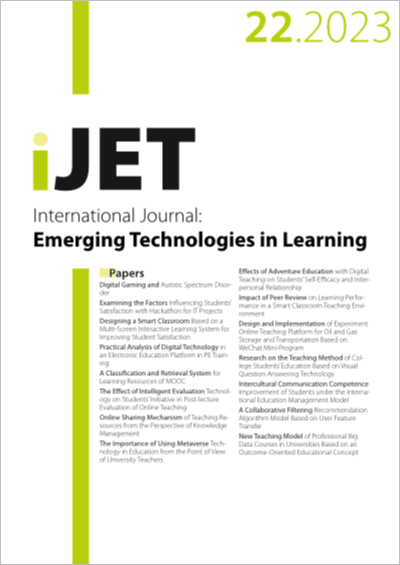Examining the Factors Influencing Students’ Satisfaction with Hackathon for IT Projects
DOI:
https://doi.org/10.3991/ijet.v18i22.42691Keywords:
Information Technology, Projects, Hackathon, Factor Analysis, Student SatisfactionAbstract
Education-related hackathons provide a dynamic and participatory method of teaching where students take an active role and become inventors and problem solvers. It encourages teamwork, critical thinking, and the use of technology, preparing students for the demands of the workforce of the twenty-first century. Although it has played a significant role in changing enterprises and society at large, its impact on academia has not yet been adequately examined. Studying the factors influencing student satisfaction with the use of hackathons for teaching and learning is crucial and pertinent given that South African educational institutions are still in the early phases of employing hackathons. The study sought to determine the factors that contributed to students’ satisfaction with hackathons for IT project. To achieve the goal, a model incorporating the self-efficacy and satisfaction constructs with TAM variables (perceived usefulness (PU), perceived ease of use (PEOU), and behavioral intention (BI)) was developed. To test the model, an online questionnaire-based survey was carried out on 180 IT students who had taken part in a hackathon. Exploratory factor analysis was performed to assess the validity of the results, while Cronbach’s alpha was used to assess reliability. The hypothesis in the suggested model was verified by using correlation to assess relationships between the constructs, while linear regressions were utilized to assess influences between variables. The Pearson correlation result showed that self-efficacy and behavioral intention have a moderately positive and statistically significant relationship with student satisfaction when using hackathon for IT projects, and the regression analysis revealed that students’ use of hackathons for IT projects is positively influenced by perceived usefulness and self-efficacy. The study identified factors that were positively correlated with and impacted students’ satisfaction with the use of hackathon for IT projects, which forms the primary contribution of this research work. By enabling a form of social learning where knowledge is created among students, the use of hackathon for IT projects will help change the learning environment from a teacher-centered to a learner-centered one.
Downloads
Published
How to Cite
Issue
Section
License
Copyright (c) 2023 Kayode Oyetade, Anneke Harmse, Tranos Zuva

This work is licensed under a Creative Commons Attribution 4.0 International License.



